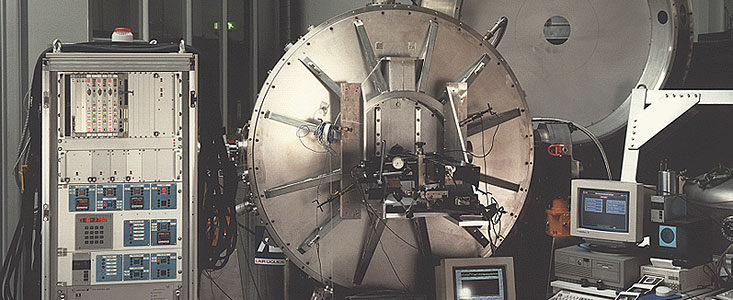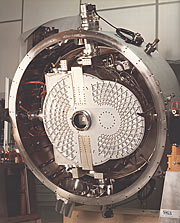Press Release
ISAAC Undergoes Tests at ESO
14 August 1996
ISAAC (Infrared Spectrograph And Array Camera) will be the first major instrument to be installed at VLT Unit Telescope no. 1; according to the current planning, this will happen by mid-1998. ESO Press Photo eso9635a shows this complex instrument during the present, thorough technical tests in the Infrared Laboratory at the ESO Headquarters in Garching (Germany).
ISAAC is a multi-mode instrument that operates at very low (cryogenic) temperature. The cold structure which supports the various opto-mechanical sub-systems is enclosed in a vacuum vessel and is cooled to 80 K (-193 C) by means of a continuous flow of liquid nitrogen. During normal operation of the instrument, two closed-cycle coolers keep the optical components at 80 K and the two detectors at even lower operating temperatures (30 and 50 K).
The various subsystems of ISAAC have been carefully tested at operating temperature during the last months in a separate test facility. Now the complete instrument has been integrated and the optics has been aligned and adjusted in order to get the best possible images. During this phase the entire system is tested together and all critical areas are very thoroughly measured and analyzed. For instance, the vacuum performance of the system is measured and the leak and outgassing rates are measured by means of a mass-spectrometer (according to specifications, the instrument should maintain the high vacuum for at least 6 months). Moreover, the cryogenic performance of the pre-cooling system (nitrogen) as well as the steady-state system (helium) is tested. For this the instrument is fitted with 15 thermal sensors which are connected to a computerized scanning system.
In addition, the optical quality (especially the alignment of the various optical elements) is tested at cryogenic operating temperature. This measurement is done using an optical interferometer which allows to compare the beam after passing through the instrument with a perfectly flat wave-front.
The tests also concern the mechanical stability of the cold assembly with regard to the external references. For this three small mirrors are glued onto the cold structure. The positions of these mirrors are accurately recorded with a laser interferometer and an electronic autocollimator. Finally, the level of vibration introduced by the cooling system is measured by using an accelerometer and a laser interferometer. This is very important, since an excessive level of vibration would disturb any interferometric observation with the VLT.
eso9635a shows ISAAC during the preceding integration phase. Here the instrument is installed on the special maintenance system which enables it to be lifted onto the optical axis and to be rotated for integration and maintenance.
Inside the vacuum vessel (without the front flange), we can here see the fully assembled cold structure fitted with the pre-cooling tubing in which liquid nitrogen will flow in order to cool the instrument to its operating temperature. Also visible are the two closed-cycle coolers and their thermal links to the cold structure which are used during the operation.
About the Release
| Release No.: | eso9635 |
| Legacy ID: | Photo 35a-b/96 |
| Name: | ISAAC |
| Type: | Unspecified : Technology : Observatory : Instrument |
| Facility: | Very Large Telescope |
| Instruments: | ISAAC |
Our use of Cookies
We use cookies that are essential for accessing our websites and using our services. We also use cookies to analyse, measure and improve our websites’ performance, to enable content sharing via social media and to display media content hosted on third-party platforms.
ESO Cookies Policy
The European Organisation for Astronomical Research in the Southern Hemisphere (ESO) is the pre-eminent intergovernmental science and technology organisation in astronomy. It carries out an ambitious programme focused on the design, construction and operation of powerful ground-based observing facilities for astronomy.
This Cookies Policy is intended to provide clarity by outlining the cookies used on the ESO public websites, their functions, the options you have for controlling them, and the ways you can contact us for additional details.
What are cookies?
Cookies are small pieces of data stored on your device by websites you visit. They serve various purposes, such as remembering login credentials and preferences and enhance your browsing experience.
Categories of cookies we use
Essential cookies (always active): These cookies are strictly necessary for the proper functioning of our website. Without these cookies, the website cannot operate correctly, and certain services, such as logging in or accessing secure areas, may not be available; because they are essential for the website’s operation, they cannot be disabled.
Functional Cookies: These cookies enhance your browsing experience by enabling additional features and personalization, such as remembering your preferences and settings. While not strictly necessary for the website to function, they improve usability and convenience; these cookies are only placed if you provide your consent.
Analytics cookies: These cookies collect information about how visitors interact with our website, such as which pages are visited most often and how users navigate the site. This data helps us improve website performance, optimize content, and enhance the user experience; these cookies are only placed if you provide your consent. We use the following analytics cookies.
Matomo Cookies:
This website uses Matomo (formerly Piwik), an open source software which enables the statistical analysis of website visits. Matomo uses cookies (text files) which are saved on your computer and which allow us to analyze how you use our website. The website user information generated by the cookies will only be saved on the servers of our IT Department. We use this information to analyze www.eso.org visits and to prepare reports on website activities. These data will not be disclosed to third parties.
On behalf of ESO, Matomo will use this information for the purpose of evaluating your use of the website, compiling reports on website activity and providing other services relating to website activity and internet usage.
Matomo cookies settings:
Additional Third-party cookies on ESO websites: some of our pages display content from external providers, e.g. YouTube.
Such third-party services are outside of ESO control and may, at any time, change their terms of service, use of cookies, etc.
YouTube: Some videos on the ESO website are embedded from ESO’s official YouTube channel. We have enabled YouTube’s privacy-enhanced mode, meaning that no cookies are set unless the user actively clicks on the video to play it. Additionally, in this mode, YouTube does not store any personally identifiable cookie data for embedded video playbacks. For more details, please refer to YouTube’s embedding videos information page.
Cookies can also be classified based on the following elements.
Regarding the domain, there are:
- First-party cookies, set by the website you are currently visiting. They are stored by the same domain that you are browsing and are used to enhance your experience on that site;
- Third-party cookies, set by a domain other than the one you are currently visiting.
As for their duration, cookies can be:
- Browser-session cookies, which are deleted when the user closes the browser;
- Stored cookies, which stay on the user's device for a predetermined period of time.
How to manage cookies
Cookie settings: You can modify your cookie choices for the ESO webpages at any time by clicking on the link Cookie settings at the bottom of any page.
In your browser: If you wish to delete cookies or instruct your browser to delete or block cookies by default, please visit the help pages of your browser:
Please be aware that if you delete or decline cookies, certain functionalities of our website may be not be available and your browsing experience may be affected.
You can set most browsers to prevent any cookies being placed on your device, but you may then have to manually adjust some preferences every time you visit a site/page. And some services and functionalities may not work properly at all (e.g. profile logging-in, shop check out).
Updates to the ESO Cookies Policy
The ESO Cookies Policy may be subject to future updates, which will be made available on this page.
Additional information
For any queries related to cookies, please contact: pdprATesoDOTorg.
As ESO public webpages are managed by our Department of Communication, your questions will be dealt with the support of the said Department.


